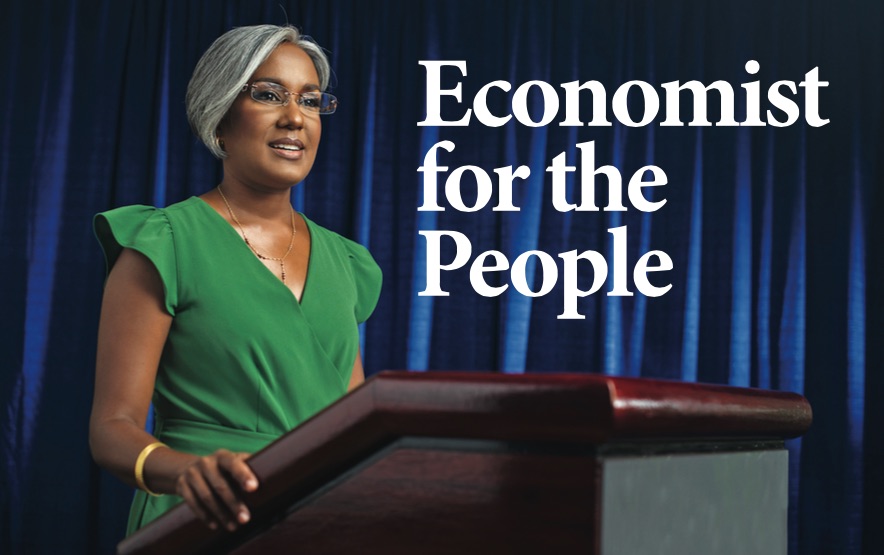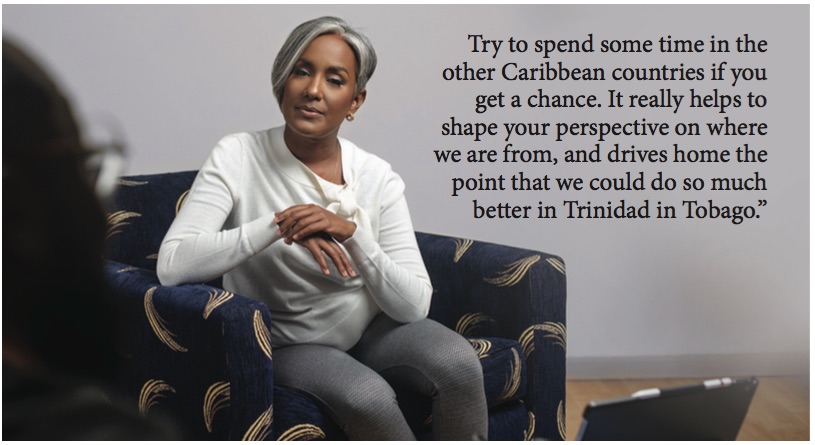
Marla Dukharan shares her analysis from a Caribbean perspective in a sometimes wry Caribbean voice
“What is important is to be committed to your craft, believe in what you are doing, and try to make a difference. That's why I get up every morning and do what I do, to try to get people to understand what's really happening.”
These words are from UWI graduate Marla Dukharan, one of the region's leading economists and advisors, whose valuable insights on Caribbean economic issues have been used to influence both public policy and private sector decision-making throughout the years.
Marla has been working in the field for well over two decades and her career has seen her hold important roles in several major financial establishments including: Republic Bank Ltd, Caribbean Money Market Brokers Limited (CMMB), RBC Financial (Caribbean) Ltd, and Bitt Inc.
She is also a highly sought after speaker at both regional and international conferences, and shares many of her ideas online via her website and YouTube channel. Her monthly Caribbean Economic Report is valued for its insightful analysis of economic activity within the major economies of the Caribbean and also for its breakdown of the effects of geopolitical events on the region.
Her frank and unique communication style is often tinged with a touch of humour, as can be seen in some of the titles of her lectures and webinars including, “Why Inflation Targeting is the Best Thing since Ackee and Saltfish” and “Pick up Something and Run With It? Culture, Corruption and Impunity”.
To Marla, being an economist is more than just a career, it is a calling. “Ever since that day I opened my first ever economics textbook, Economics: A Student's Guide by John Beardshaw, I knew that this is what I was put on this Earth to do. I had never really considered studying economics until A-levels, but reading that book completely changed my life. It was as though a hundred light bulbs went off in my head at once and everything just came together and made perfect sense.”
A graduate of the Faculty of Social Sciences, she completed all of her tertiary education at the UWI St Augustine, obtaining a BSc, MSc, and eventually MPhil degree in economics from the university. While she acknowledges the role that UWI has played in shaping her career, she also stresses that most of her learning has taken place outside of the classroom.
“Of course UWI has played a fundamental role in shaping both my career and who I am as an economist,” says Marla, “but a lot of what I have come to learn and understand about the way that our economies work and how to apply this understanding to solutions and policy recommendations has come from researching, observing, and studying these regional economies first-hand. It was really having to report and write on these economies as well as to conduct surveillance on them for many years that has given me this very contemporary, broad understanding of how they work.”
One of Marla's key beliefs is that our Caribbean economic policies need to be modeled after the reality of the region's situation and not from theoretical knowledge gained from textbooks geared towards more developed economies in other parts of the world.
“I try to write a lot about this, and I also try to have discussions with people on video and podcasts because I feel like this is something that really needs to be ventilated: the fact that we are different. We need to look at the actual conditions that we face and how our economies really work,” she says.
In spite of the many serious challenges that it faces, Marla believes that the Caribbean is indeed a region of limitless potential:
“Here in the Caribbean, we have massive amounts of natural resources, but we also have some of the most resilient, resourceful, brilliant, and talented people in the world. We could be so successful here and ensure that we have happy, healthy, prosperous people throughout the region; but unfortunately there are a lot of things we don't get right.”

Pointing out these problems, in spite of the criticism that it can engender, is what Marla believes is one of the fundamental responsibilities of both economists as well as other analysts in the region.
“We have a duty to find the data, analyse it in an impartial, dispassionate way, and then put our views on the data out there whether or not it's going to be a view that people want to hear, and whether or not you are going to be criticised for it.”
She adds, “A lot of people misinterpret facts as criticism, but part of being an analyst is to fight against all the misinformation that is deliberately spread, and to present the truth. On the other hand, when we find something that is worthy of praise that the average person might not be aware of, then we also have a responsibility to bring that to the public's attention.”
Although Trinidad is home, Marla has been living in Barbados since 2018 and has travelled extensively throughout the Caribbean. Her message to her fellow Trinbagonians is as follows:
“I would encourage people in Trinidad and Tobago to really travel around this region and see it first-hand. We come from a country that the rest of the region sees as rich, but when you travel to the other islands and see what they've been able to do with so little, when you see the kind of stability and effective governance that they've been able to create, it's really eye-opening. Try to spend some time in the other Caribbean countries if you get a chance. It really helps to shape your perspective on where we are from, and drives home the point that we could do so much better in Trinidad in Tobago.”